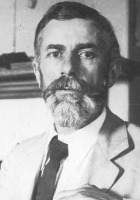Edward Carpenter
Edward Carpenter Poems
So thin a veil divides
Us from such joy, past words,
Walking in daily life- the business of the hour, each detail seen to;
Yet carried, rapt away, on what sweet floods of other Being:
...
At night in each other's arms,
Content, overjoyed, resting deep deep down in the darkness,
Lo! the heavens opened and He appeared-
Whom no mortal eye may see,
...
O APRIL, month of Nymphs and Fauns and Cupids,
Month of the Sungod's kisses, Earth's sweet passion,
Of fanciful winds and showers;
Apollo, glorious over hill and dale
...
All night by the shore.
The obscure water, the long white lines of advancing foam, the rustle and thud, the panting sea-breaths, the pungent sea-smell,
The great slow air moving from the distant horizon, the immense mystery of space, and the soft canopy of the clouds!
...
Over the great city,
Where the wind rustles through the parks and gardens,
In the air, the high clouds brooding,
In the lines of street perspective, the lamps, the traffic,
...
Edward Carpenter Biography
Edward Carpenter (29 August 1844 – 28 June 1929) was an English socialist poet, philosopher, anthologist, and early LGBT activist. A leading figure in late 19th- and early 20th-century Britain, he was instrumental in the foundation of the Fabian Society and the Labour Party. A poet and writer, he was a close friend of Walt Whitman and Rabindranath Tagore, corresponding with many famous figures such as Annie Besant, Isadora Duncan, Havelock Ellis, Roger Fry, Mahatma Gandhi, James Keir Hardie, J. K. Kinney, Jack London, George Merrill, E D Morel, William Morris, E R Pease, John Ruskin, and Olive Schreiner. As a philosopher he is particularly known for his publication of Civilisation, Its Cause and Cure in which he proposes that civilisation is a form of disease that human societies pass through. Civilisations, he says, rarely last more than a thousand years before collapsing, and no society has ever passed through civilisation successfully. His 'cure' is a closer association with the land and greater development of our inner nature. Although derived from his experience of Hindu mysticism, and referred to as 'mystical socialism', his thoughts parallel those of several writers in the field of psychology and sociology at the start of the twentieth century, such as Boris Sidis, Sigmund Freud and Wilfred Trotter who all recognised that society puts ever increasing pressure on the individual that can result in mental and physical illnesses such as neurosis and the particular nervousness which was then described as neurasthenia. An early advocate of sexual freedoms, he had a profound influence on both D. H. Lawrence and Aurobindo, and inspired E. M. Forster's novel Maurice.)
The Best Poem Of Edward Carpenter
So Thin A Veil
So thin a veil divides
Us from such joy, past words,
Walking in daily life- the business of the hour, each detail seen to;
Yet carried, rapt away, on what sweet floods of other Being:
Swift streams of music flowing, light far back through all Creation shining,
Loved faces looking-
Ah! from the true, the mortal self
So thin a veil divides!
